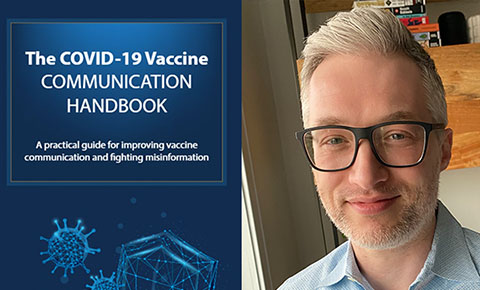Experts: New Resource Can Fight COVID-19 Misinformation

Northwestern University professor David Rapp was among more than two dozen expert scientists from around the world who contributed to a new user-friendly handbook designed to help fight the spread of misinformation about the coronavirus vaccines.
The online, evidence-based guide, The Covid-19 Vaccine Communication Handbook, is a resource for journalists, doctors, nurses, policymakers, researchers, teachers, students, parents – anyone who wants to know more about COVID-19 vaccines, how to talk to others about them, and how to accurately challenge information about the vaccines.
It is a living document, as the guide links to a wiki, offering people real-time access to more in-depth research and guidance as the vaccine rollout gains pace.
“This guide offers clear and understandable advice for disseminating COVID-19 vaccination information, and for combatting related misinformation, as informed by research and best practices,” Rapp said.
The interdisciplinary team of authors includes researchers with expertise in vaccine psychology, decision making, behavioral development, communication, and education.
Rapp, a psychologist and learning scientist in the School of Education and Social Policy, studies language, memory, and why we’re so susceptible to misinformation. He contributed to a section outlining the dangers of “a false sense of balance.”
A journalist, for example, may interview a person who is pro-vaccination and someone who opposes vaccines, as if they represented equal sides in an ongoing scientific debate. “But that makes it seem like there are two equivalently appropriate and empirically supported views,” Rapp said. “They aren’t equivalent – there is enormous scientific and health professional support for vaccination, and very little evidence supporting anti-vax claims.”
This “false equivalence or false balance,” is misleading, Rapp says, and “we need to figure out ways to ensure people have access to the right information rather than articles and viewpoints indicating the anti-vax view is tenable.”
The project was led by Stephan Lewandowsky, chair in cognitive science at the University of Bristol. It is a creation of SciBeh, a group working to reconfigure behavioral science for crisis knowledge management.
The project organizers received no direct funding to prepare the Handbook and the Wiki. Many academics received funding for research projects, and that information can be found on the authors and acknowledgements page.
“The safest and most effective vaccines against COVID-19 are of no use if people cannot, or will not, take them,” said Julie Leask, a handbook co-author and professor at the University of Sydney who chairs one of the World Health Organization working groups on vaccinations. “More than ever, we need to be communicating effectively, and the handbook brings the science of communication to the communicators.”